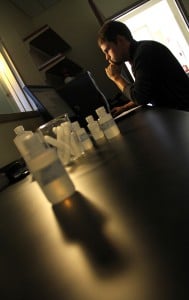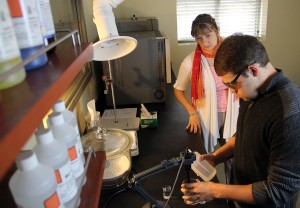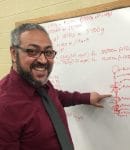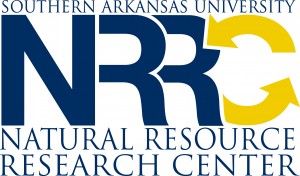 The Natural Resource Research Center at Southern Arkansas University became qualified to compete for federal and state water and soil testing grants and contracts upon passing inspection on Jan. 30.
The Natural Resource Research Center at Southern Arkansas University became qualified to compete for federal and state water and soil testing grants and contracts upon passing inspection on Jan. 30.
Passing the Arkansas Department of Environmental Quality (ADEQ) inspection opens the doors for the NRRC – a facility in SAU’s College of Science and Technology – to act as a conduit for internal and external research collaborations and as a gateway for research, technical assistance and scientific counseling to individuals, agencies and industries.
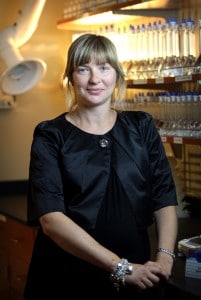
SAU President Dr. David Rankin said, “The certification is a giant step for our research capabilities. Dr. Geme and her staff are to be congratulated on their landmark accomplishment.”Geme said the recognition of the ADEQ allows the NRRC opportunities to generate additional income for SAU and is a boon for its students.“This is an especially exciting time for students who are interested in the sciences. Students working at the NRRC will have the opportunity to work with the state of the art instrumentation that is currently available to gain hands-on experience,” Geme said. “By having this hands on experience, it will make student researchers more competitive when trying to find jobs or when getting into professional schools after graduation.”The 3,000-square-foot facility was completed in 2010 and was funded by SAU and a grant from the Department of Commerce through the Arkansas Economic Development Administration. It consists of seven separate laboratories and is thoroughly equipped with state-of-the-art analytical instrumentation to meet the ever evolving research needs of the region.
According to Geme, an ADEQ certified lab should help in recruitment to bring in more students to the region who are interested in pursuing science-related careers.
Dean of the College of Science and Technology Dr. Scott McKay said the NRRC will provide an accessible gateway to the expertise and resources of the faculty. The NRRC is also poised to provide the combined knowledge and consulting in the areas of general research and development, quality control, analytical chemistry, engineering, alternative energy and fuels, water, and soil chemistry.
According to McKay, each project will be evaluated and a team of scientists, engineers and researchers will be committed to address the problems faced by industry partnerships, interns, and to consult in water chemistry, soil chemistry, mechanical engineering, chemical engineering, lake/conservation biology, and computer science. The first Inductively Coupled Plasma (ICP) spectrometer came to SAU around 2007 after the passing of the Lignite Act, when the department was still housed in Overstreet. Later, microwave digester was installed in Overstreet. A Federal Economic Development Grant provided $1 million, which was matched by SAU, toward the construction of the NRRC. The primary writers of the grant were Dr. Donna Allen and Deborah Lewis. The venture was supported by Magnolia Economic Development Corporation, the Magnolia Industrial Park, and state and federal legislators. Another grant from Shimadzu Corp. provided funds for “tooling up” the original equipment, according to Dr. Scott White, department chair of chemistry and physics at SAU.
For more information about the Natural Resource Research Center visit https://web.saumag.edu/science/nrrc/.

